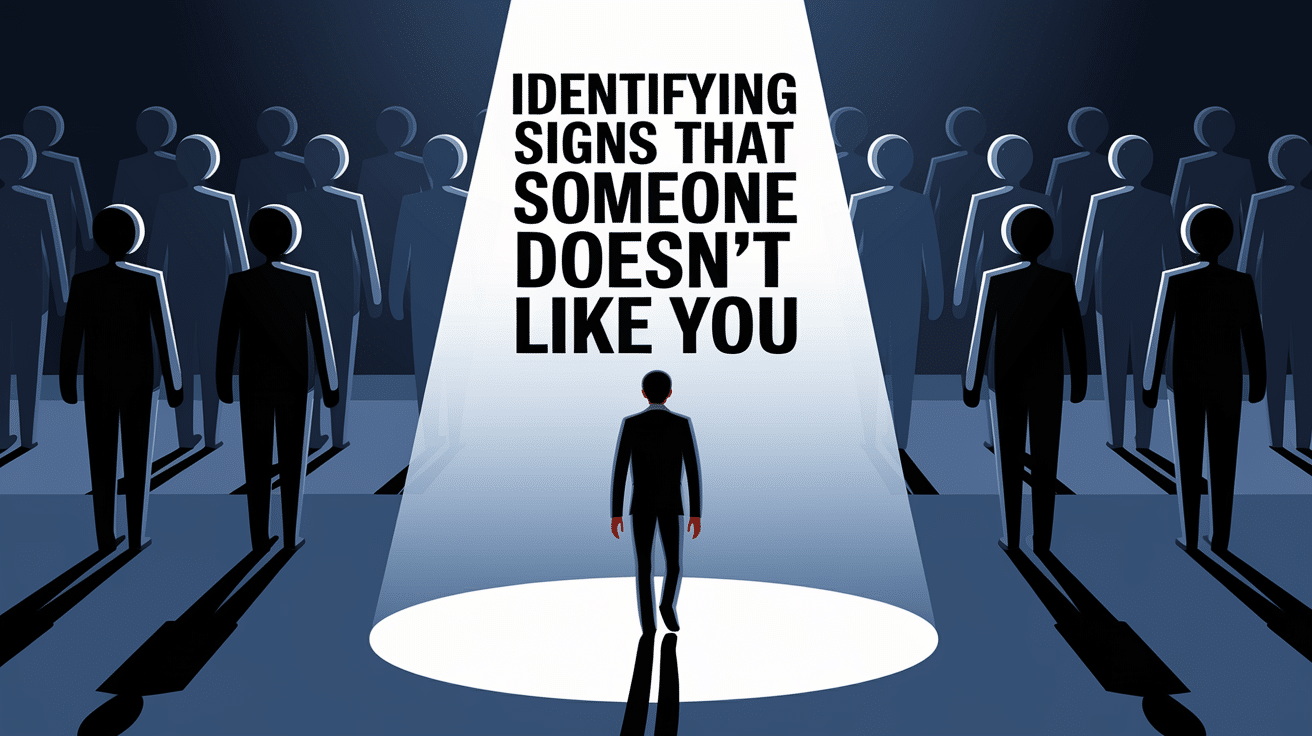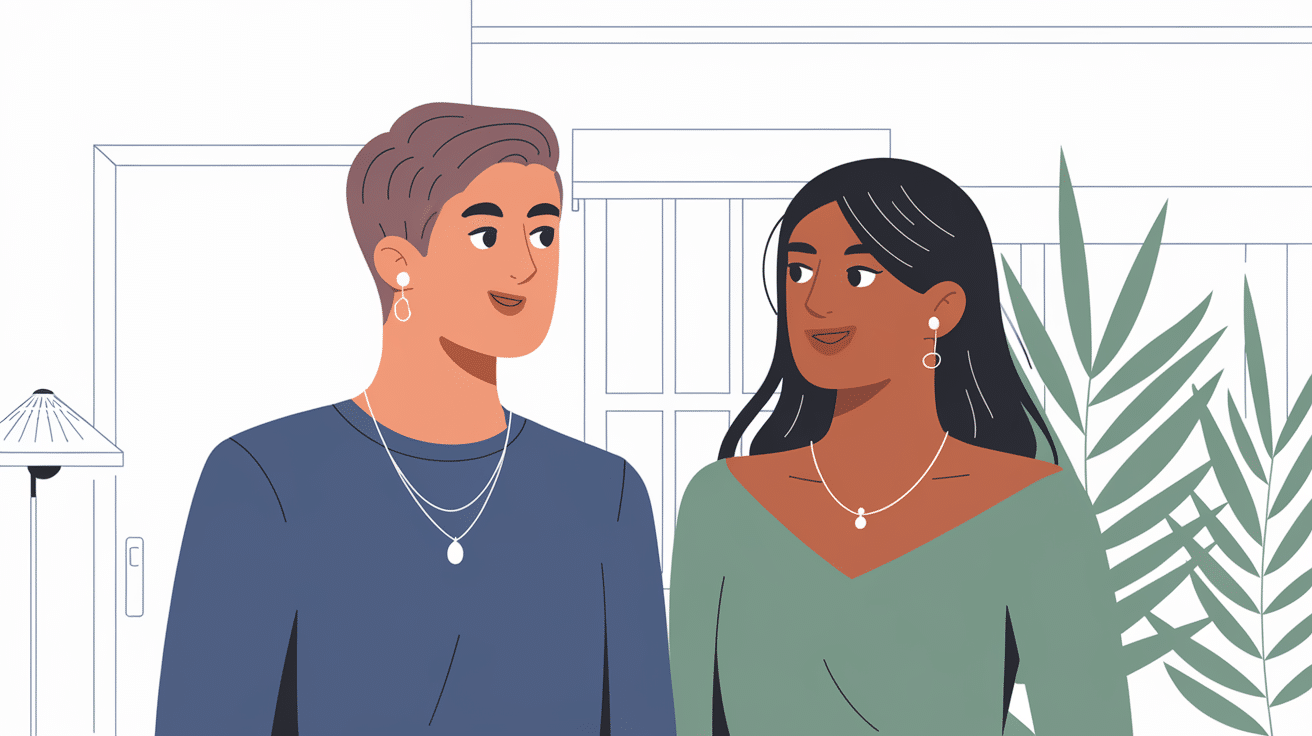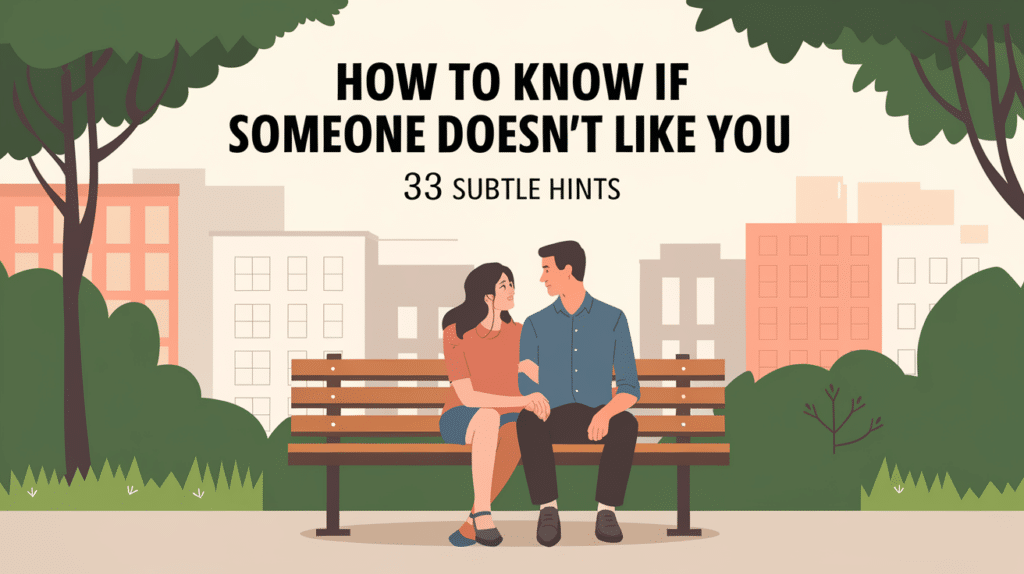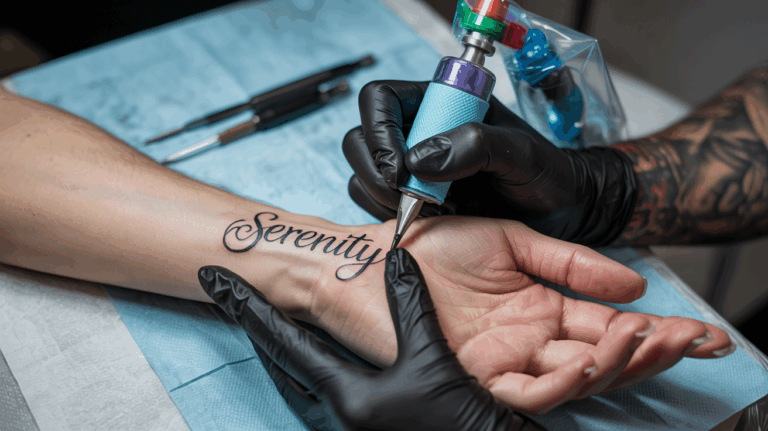People don’t always say what they feel, but their actions speak volumes. Catching these subtle signals early can save someone from investing time and energy in one-sided connections.
Not everyone will openly show their dislike. Instead, they drop small hints through their body language, conversation patterns, and behavior around others.
While one sign alone might not mean much, several hints together often tell the real story.
Let’s explore these 33 signs that might indicate someone isn’t as fond of you as they pretend to be. Remember, this isn’t about paranoia or overthinking – it’s about understanding social cues and protecting your emotional well-being.
Understanding the Change of Unfavorable Interactions
People often wonder why certain interactions leave them feeling uneasy or uncomfortable. These moments stem from various subtle cues and behaviors that create friction in our daily connections.
- Think about a time when someone interrupted you mid-sentence or checked their phone while you shared something important.
- Small actions convey respect. Problems arise from mismatched communication styles—some value direct speech, and others prefer subtle hints.
- Body language plays a key role, too. A person might cross their arms because they’re cold, but others read it as defensive or unwelcoming. Eye contact tells its own story – too much can feel intense, too little might signal disinterest.
- Social energy differences create another layer of complexity. A naturally quiet person might find an enthusiastic extrovert overwhelming.
- Past experiences color our present interactions in ways we don’t always notice. If someone reminds us of a person who once hurt us, we might unconsciously pull away.
Recognize Signs That Someone Dislikes You

1. They Avoid Eye Contact
Eye contact tells us a lot about how someone feels. When a person keeps looking away, checking their phone, or scanning the room, they might be telling us something without words.
People who want to talk naturally look at each other, sharing moments of connection. But someone who avoids your gaze might feel uneasy or wish they were somewhere else.
2. Their Body Language Feels Closed Off
Body language reveals what words often hide.
When someone shields themselves with crossed arms or turns away while talking, their discomfort becomes clear without a single word spoken. The space they create by leaning back tells its own story about how they really feel.
3. They Give Short, Dry Answers
Conversations should feel like a rally, not a dead-end.
When you ask, “How was your weekend?” and receive a simple “fine” without any follow-up, it might be a sign that the person isn’t very engaged. Engaging conversations usually involve a bit more—like, “It was great! I went hiking. What about you?”
But they’re not making an effort if their replies are always short, flat, and uninviting. And if they’re chatty with others but not with you? That says everything.
4. They Never Initiate Conversations
Watch who makes the first move in conversations. If you’re always the one reaching out, sending messages, or trying to connect, you might be the only one investing in this relationship.
The silence when you stop initiating can be the clearest message of all.
5. They Frequently Cancel Plans or Make Excuses
Do they always have a last-minute excuse? If someone repeatedly cancels, it may be a sign that they’re not spending time with you. They’d make the effort if they truly wanted to see you. Frequent cancellations could mean they don’t prioritize the relationship.
6. They Exclude You from Group Activities
Some people deliberately leave others out, making them feel isolated. This can happen at work, in friendships, or even within families.
If you notice a pattern, it might indicate a deeper issue. They make plans without inviting you, and even when others are included, they change the subject when you ask about group outings.
If someone often leaves you out, it might mean they don’t fully appreciate the wonderful energy you bring to their circle.
7. They Don’t Engage with You on Social Media
In today’s world, social media wonderfully mirrors our real-life connections.
If someone seems to engage with everyone’s posts, like and comment, but doesn’t acknowledge yours, it’s something to take note of. While we should never rely solely on validation from others, if they interact with everyone except you, it could indicate they’re pulling away.
8. They Seem Distracted when You Talk
You’re telling them about something important—maybe a tough day or an exciting update—and they keep checking their phone, nodding absentmindedly, or saying “uh-huh” without really listening.
A real friend leans in, makes eye contact, and asks questions because they care. Someone who’s not interested zones out, gives generic responses, or worse—interrupts with something about themselves.
9. They only Talk About Themselves
A conversation should be a two-way street, not a one-man show. If they dominate every chat, barely pause to listen, and never ask about you, they’re not valuing the connection.
Have you ever had a chat where you shared something personal, and instead of acknowledging it, they immediately turned it back to their own experience? “Oh, you had a rough day? That reminds me of my terrible week.”
It’s exhausting, and over time, it makes you feel invisible.
10. They Show No Enthusiasm for Your Achievements
You worked hard, hit a milestone, or finally achieved something big. You share the news, expecting excitement, but all you get is a dull “nice” or “cool.”
If they can’t cheer for you, they probably don’t want to see you win. That’s not the kind of energy you need around you.
11. They Avoid Physical Contact
Body language speaks louder than words. If someone constantly avoids physical touch—no hugs, no pats on the back, not even a friendly shoulder tap—it can be a sign they’re uncomfortable or creating distance.
Think about it: good friends naturally high-five, nudge, or lean in.
But if someone pulls away or stiffens up when you get close, it’s a sign they don’t feel as connected as you do.
12. Their Tone Is Sarcastic
There’s joking with a friend, and then those comments sting. “Oh wow, you finally showed up on time,” or “I guess that’s one good idea you’ve had.”
Playful teasing makes you laugh. It feels lighthearted. But sarcasm that puts you down embarrasses you or feels like a dig? That’s different. If you call it out and they say, “relax, it’s just a joke,” that’s a red flag.
13. They Act Differently Around Others
They act differently around others. Some people switch their behavior depending on who they’re with. If someone treats you well privately but ignores or belittles you in a group, it’s a red flag.
14. They Never Defend You
They never defend you. Have you ever been in a situation where someone stayed silent while others spoke badly about you?
A genuine friend or ally always stands up for you, even in the little moments.
If they choose to remain silent while others are being critical, it might suggest they don’t fully appreciate your presence.
15. They Act Differently Around Others
People naturally adjust their behavior depending on who they’re with, but it’s a red flag if someone treats you noticeably worse than they treat others. Do they seem warm & friendly to everyone else but distant from you?
If their energy shifts the moment you’re around, take it as a sign.
16. The Eye Roll That Says It All
Have you ever caught someone rolling their eyes at you? That’s not just attitude – it’s straight-up disrespect. Let’s jump into what this means.
When someone rolls their eyes at you, they shout “whatever” without saying a word.
Think about that coworker who does this every time you speak up in meetings or that friend who can’t help but roll their eyes when you share your weekend plans. It’s their way of dismissing you without having the guts to say it to your face.
17. They Don’t Remember Details
Do they forget things you’ve told them, even important ones? This can make you feel unimportant or like the relationship is one-sided.
If someone consistently forgets what matters to you, they may not truly value your presence in their life.
18. They Keep Conversations Superficial
Not every conversation has to be deep, but if someone constantly avoids meaningful discussions, they may not be emotionally invested in the relationship.
19. That Gut Feeling of Bad Vibes
Do you know that there is a heavy feeling in your stomach when someone just gives off negative energy? Trust Your Instincts – They’re Rarely Wrong.
It’s like stepping into a room and instantly feeling it cool down. Maybe it’s that moment when your friend’s smile fades away as you join the group chat, or how your classmate’s energy changes the second you take a seat.
These Vibes Aren’t Just in Your Head – They’re Your Emotional Radar Picking up Real Signals.
20. They Downplay Your Feelings
Ever Share Something Important, Only To Be Told You’re “overreacting” or “too Sensitive”? That’s a Sign of Someone Who Doesn’t Respect Your Emotions.
A Caring Person Validates Your Feelings, While a Dismissive One Brushes Them Off. Your Emotions Are Valid—if Someone Constantly Dismisses Them, They Don’t Respect You.
21. They Always Make You the Punchline
Ever Notice How Some People Always Seem to Pick You as Their Comedic Target? it’s Not Just Friendly Banter Anymore when Every Joke Circles Back to You.
Constant Targeting Through Humor Is Actually a Form of Social Bullying.
When They Laugh at You, Not with You, and The Jokes Often Hit a Bit Too Close to Home. These “jokes” Usually Focus on Your Insecurities, Mistakes, or Personal Traits.
22. They Never Apologize
Everyone Makes Mistakes, but If Someone Never Admits when They’re Wrong, That’s a Problem.
Self-Aware People Own Up to Their Mistakes, While an Arrogant One Shifts Blame. IF They Can’t Apologize when They’re Wrong, They’re Not Mature Enough for A Real Connection.
23. They Keep You as a Backup
They only call when their first plans fall through. You’ll notice a pattern of last-minute invites and vague maybes, but never solid plans. It’s like being a spare tire – only needed when the main one goes flat.
These friends often keep you around with just enough attention to stay connected, but never enough to make you feel valued.
They’ll make vague plans but rarely follow through, leaving you wondering where you stand in their life.
24. They Try to One-Up You
Every success story you share becomes their launching pad for a bigger tale.
If you ran a mile, they ran three. When you share good news about work, they quickly shift the spotlight to their bigger achievements.
This behavior often comes from their own insecurities.
25. They Disappear When You Need Them
Fair-weather friends show their true nature during tough times.
They’re quick to join celebrations but vanish when you face challenges. It seems like some people often have ready-made excuses when you reach out for support—they might be really busy with their own challenges or, sometimes, just don’t respond to your messages.
26. They Never Show Appreciation
Some people take your kindness for granted. Regardless you help them move, listen to their problems, or do them favors, they never say thanks.
They expect your support but treat it as a given rather than a gift.
27. They Act Passive-Aggressive
Instead of expressing feelings directly, these people use subtle jabs and indirect comments to communicate.
Sometimes, they may choose to give the silent treatment when upset or make sarcastic comments about your choices. This can leave you feeling a bit confused, wondering what you might have done wrong.
When confronted, they deny any ill intent, saying “you’re too sensitive” or “it was just a joke.” This behavior creates a toxic environment where you always second-guess their true meaning.
28. They Make Everything Your Fault
They measure your life against others like it’s a competition.
Your achievements get sized up against your siblings, friends, or coworkers. These comparisons aren’t meant to help you grow – they’re designed to make you feel small.
29. They Constantly Compare You to Others
These folks never miss a chance to measure you against others. They might casually mention how well your coworker handles projects, or how their other friend always makes time for them.
Such comparisons chip away at your confidence day by day. The worst part? Their examples often feature people you barely know or situations you can’t verify.
30. They Give Backhanded Compliments
Their words sound nice at first, but leave you feeling strangely hurt.
“You look great – did you lose weight?” or “Your apartment is so cozy for its size!”. These seemingly nice comments carry hidden barbs. After all, they’ll say, they were just trying to be nice. But real compliments lift you up, while their words always seem to pull you down.
31. They Ignore Your Boundaries
When you set limits, they push past them like they don’t exist. Your “no” becomes their challenge rather than their stop sign. They’ll call late at night despite your requests, or share your private information after you’ve asked them not to.
32. They Make You Feel Like a Burden
Their sighs, eye rolls, and dramatic pauses when you need help speak volumes. These people have perfected making normal requests feel like huge impositions.
Ask them a simple question, and they respond as if you’ve asked them to solve world hunger. They might help you, but their body language and tone scream reluctance. Every favor comes with a side of guilt, making you think twice before asking for anything.
33. They Act Differently When They Need Something
Watch how their behavior changes when they want something from you.
The usual cold shoulder turns into warm smiles when they need your help. Once they get what they want, they return to their distant selves.
Building Connection: Overcoming Perceptions of Dislike

Sometimes, we get stuck thinking someone doesn’t like us, but the truth might be simpler than we imagine.
Often, what looks like dislike is just someone being shy, having a rough day, or dealing with their own worries. Want to bridge that gap? Start small. A simple “hey, how’s your day going?” can work wonders.
Maybe share a funny story about your morning coffee mishap or ask about their weekend plans. Keep it light and genuine.
Remember those awkward first days at a new job or school? Everyone feels that way sometimes.
The distant person might also be nervous. Give them space to warm up naturally without pushing too hard.
Most importantly, be yourself. No fancy tricks are needed – just honest, friendly vibes. Sometimes, the best connections start with a simple smile or a kind word. After all, we’re all just people trying to figure out this social stuff together.
Conclusion
Let’s be honest – noticing these signs can feel pretty rough. But here’s the thing: someone’s dislike often says more about them than about you. We’re all living our own stories, carrying our own baggage, and sometimes people just don’t click.
Instead of obsessing over who might not like you, focus on the folks who light up when you walk in. You know, the ones who remember your coffee order, laugh at your silly jokes, and actually listen when you talk.
Life’s too short to chase approval from people who don’t see your worth.
Trust your gut – if someone’s giving you these signals, maybe it’s time to invest your energy where it’s welcomed and appreciated.
After all, the right people won’t make you question where you stand.














